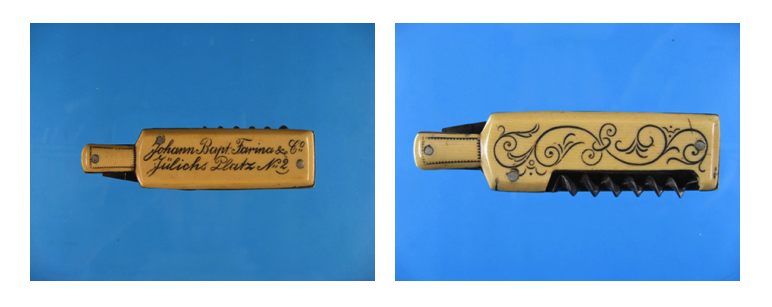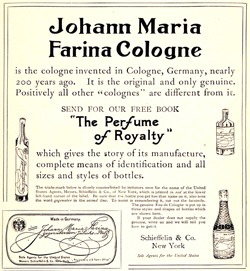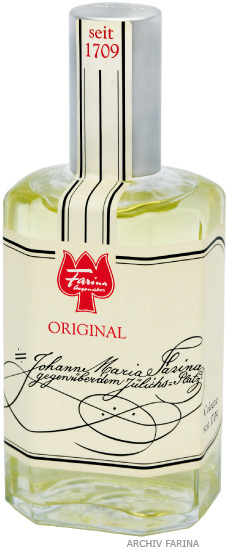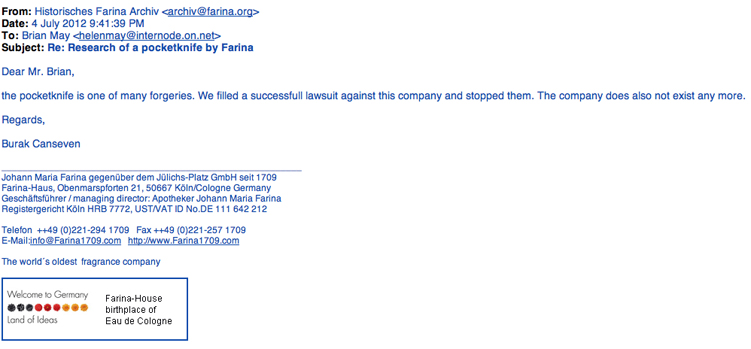Rare Pocketknife with Corkscrew Marked Johann Bapt. Farina & Co: Case of Deception.
Brian May and Steven Webb
The rare pocketknife shown below has already appeared on this website’s blog. It is 7.0 cm closed and marked with a spiral pattern on one side and Johann Bapt Farina & Co Jülichs Platz No.2 on the other. We know of only one other identically marked example- that reported by Ferd Peters in his best six for 2011.

The background is important to the story here.
The Italian, Johann Baptist Farina, arrived in Cologne from Italy and in late 1709 founded the Farina Company. His younger brother Johann Maria Farina who was already in Cologne, created a sensational perfume that he called Eau de Cologne, after his adopted city.
In 1732, Johann Baptist Farina died and Johann Maria Farina took over the company he now called “Johann Maria Farina”, a name that has remained unchanged to this day. The company was located at Jülich’s Platz, No. 4 in Cologne near the Rhine River. Sales of the citrus-based perfume expanded massively and by 1740 it was sold throughout Europe and England and took the Royal Courts by storm. Later, Queen Victoria once ordered 600 bottles. Napoleon used it by the bucket load and is said to have had his boot specially modified to fit in the long corked bottle of Eau de Cologne.
Below is an advertisement that appeared in a New York paper in 1907. The early long corked bottle can be seen, centre left

The pocketknife of interest here was registered in Britain on 4 December 1888 with Registration Number 115250 (see page 85 of Corkscrews: British Registered Designs by Frank Ellis and Barbara Ellis). The registrant was “Johann Bapt. Farina and Company, Eau de Cologne manufacturers, Jülichs Platz No. 2, Cologne”. However, in the registration drawing of the pocketknife (see page 85), the name of the registrant was crossed out “under registration policy”. Fletcher Wallis has kindly explained that this is because details of the German manufacturer were not shown on the application. Presumably the novel bottle shape of the pocketknife was the basis for registration.
Now it is interesting that German manufacturers in the 19th century produced many pocketknives in the shape of bottles and these were most suitable for advertising beverages (see page 251 of History of Pocket Corkscrews and Pocketknives by Ferd Peters and Bert Giulian). The pocketknife here can be seen in Figure 1670: it displays the swirling pattern on one side (as shown in the photograph above) but the other side is unmarked. It is described by Peters and Giulian as “unmarked, small German bottle-shaped pocketknife with bone scales (Closed 7.0 cm)”.
The existence of this unmarked pocketknife suggested to us that the Johann Maria Farina Company saw the pocketknife and realized its bottle shape resembled their hexagonal Eau de Cologne bottle (shown in the New York advertisement above, center right and also in the image below). They then asked the German manufacturer to mark the pocketknife with details of the Farina Company. The pocketknife could then be used for advertising purposes or as a souvenir from this world famous company.

We were incorrect. Following an email to the archives at Farina House in Cologne where they have extensive information on the history of the company, the following reply was received.

Our follow up emails to Burak Canseven were not answered.
However, information online established that there were many fake Farina perfume manufacturers who even copied the packaging and the product name. The real Farinas went to court to fight the product piracy, filing over 1000 lawsuits.
It seems likely that the offending company in question here (Johann Bapt. Farina & Co) also produced a fake Farina perfume, as well as the pocketknife. We suggest that they deliberately had the pocketknife made in the shape of the authentic Eau de Cologne bottle. It was likely to have been manufactured in nearby Solingen.
They had attempted to get around any legal problems by using the name “Johann Bapt. Farina & Co”- that of the original founder of the Johann Maria Farina Company. (The name of Johann Maria Farina has been used on all authentic products since Johann Maria Farina took over in 1732 as already mentioned). Secondly, the address on the pocketknife of Jülich’s Platz No. 2, is incorrect- the authentic Johann Maria Farina Company has always been at Jülich’s Platz No. 4.
The existent of the pocketknife marked only with the spiral pattern suggests that manufacturing of the pocketknife may have continued after the court case, but not of course with the offending labelling.
In any event, the small elegant and now perhaps more interesting pocketknife, appears to be very rare.

